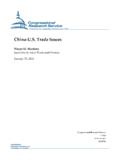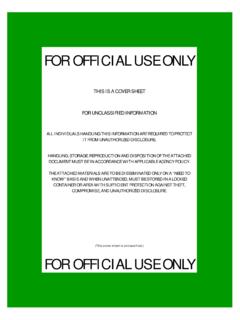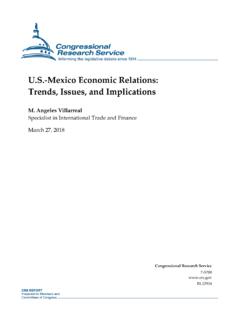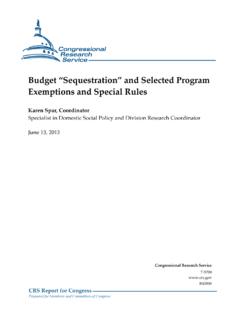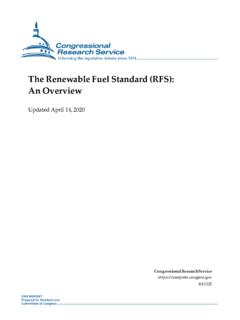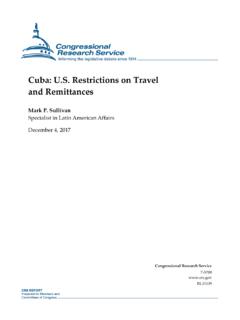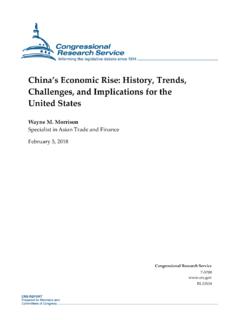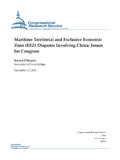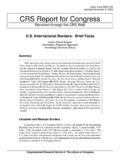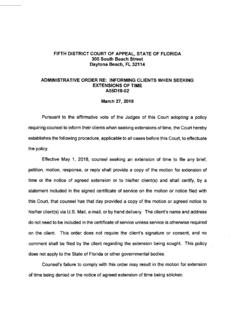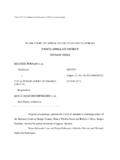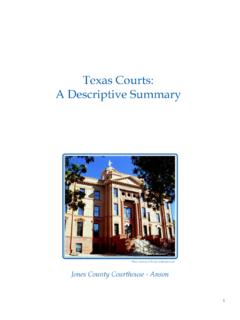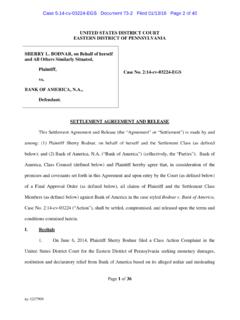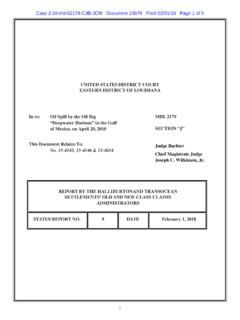Transcription of District Court Enjoins DACA Phase-Out: …
1 CRS Legal Sidebar Prepared for Members and Committees of Congress Legal Sidebari District Court Enjoins DACA Phase-Out: explanation and takeaways Hillel R. Smith, Coordinator Legislative Attorney Ben Harrington, Coordinator Legislative Attorney April 26, 2018 Update 2: On April 24, 2018, a federal District Court in the District of Columbia held that the rescission of the Deferred Action for Childhood Arrivals initiative (DACA) violates the Administrative Procedure Act (APA). The decision, NAACP v. Trump, grants permanent relief that differs from the nationwide preliminary injunctions granted by District courts in the Northern District of California and the Eastern District of New York (both analyzed below).
2 Specifically, the NAACP Court decided to vacate the DACA rescission and remand it to the Department of Homeland Security (DHS), the agency responsible for administering DACA, because the legal reasoning that formed the basis for the rescission was scant and barebones. But the District Court stayed the vacatur order for 90 days to give DHS an opportunity to better explain its rescission decision. For the time being, therefore, NAACP does not change the current availability of DACA relief: the preliminary injunctions issued by the other two District courts continue to require DHS to process DACA renewal applications but not initial applications.
3 However, if the NAACP vacatur order goes into effect at the end of the 90-day stay that is, if DHS does not supply new reasoning that adequately justifies, in the District Court s opinion, the rescission of DACA the order will require DHS to process both initial and renewal applications. The NAACP Court expressed doubt as to whether DHS will be able to provide an adequate justification. The Court noted that Trump Administration officials have shown support for the policy of protecting childhood arrivals from removal, which the Court took to suggest that [DHS] would not have rescinded DACA but for its supposed illegality. Further, the Court noted that at least one other federal District Court ruling in the District of Columbia had suggested that DACA is not illegal.
4 Meanwhile, with respect to the other DACA litigation discussed in the Sidebar below, the Court of Congressional Research Service 7-5700 LSB10057 Congressional Research Service 2 Appeals for the Ninth Circuit is scheduled to hear oral argument in the government s expedited appeal in the Northern District of California case on May 15, 2018. An expedited appeal is also pending before the Second Circuit in the Eastern District of New York case; the appellate docket (No. 18-485) suggests that the Second Circuit will hear oral argument in late June 2018. Update 1 (March 7, 2018): Following the publication of this Sidebar, additional developments have arisen that affect the Trump Administration s planned phase-out of the DACA program.
5 On February 13, 2018, the District Court for the Eastern District of New York became the second federal District Court to issue a nationwide preliminary injunction limiting the DACA phase-out to aliens who have not yet obtained DACA benefits. The District Court s injunction mirrors the nationwide injunction issued by the District Court for the Northern District of California that is discussed in this Sidebar, and the reasoning behind each injunction was largely similar. Both courts held that plaintiffs were likely to succeed on the merits of their claims under the Administrative Procedure Act that DHS s decision to end DACA was arbitrary, capricious, an abuse of discretion, or otherwise not in accordance with law.
6 On March 5, 2018, a federal District Court in Maryland, in considering yet another lawsuit challenging the planned rescission of DACA, ruled primarily in DHS s favor and held that the rescission does not violate the Administrative Procedure Act or the Constitution. That holding does not impact the two nationwide injunctions mentioned above, which continue to prohibit DHS from implementing the DACA rescission in most respects. However, the Maryland federal District Court imposed a new restriction on DHS by enjoining it from using information provided by [applicants] through the DACA program for enforcement purposes. Should DHS seek to use an individual DACA applicant s information for an enforcement purpose implicating national security.
7 Public safety or public interest, the injunction requires DHS to petition the Court for permission to do so on a case-by-case basis with in camera review. The Department of Justice has been unsuccessful in efforts to bring about a speedy resolution to the litigation surrounding the DACA phase-out. In addition to filing appeals with the relevant federal courts of appeals challenging the California and New York injunctions, the Department of Justice petitioned for Supreme Court review of the California federal District Court s decision (at the time of the petition, neither the New York nor Maryland injunctions had been issued). On February 26, 2018, the Supreme Court denied the petition, stating that [i]t is assumed that the Court of Appeals will proceed expeditiously to decide this case.
8 The two nationwide injunctions halting the phase-out of DACA with respect to persons who have already obtained relief under the initiative will remain in place while the litigation continues in the federal courts of appeals, unless the Supreme Court or the courts of appeals order otherwise. The original post from January 11, 2018, is below. Since the Trump Administration announced in September 2017 a phase-out of the Deferred Action for Childhood Arrivals (DACA) initiative, a number of lawsuits have been brought challenging the action as unconstitutional or contrary to federal laws governing agency rulemaking procedures. The Obama Administration implemented DACA in 2012 to provide work authorization and administrative relief from immigration enforcement action to certain unlawfully present aliens who entered the United States as children.
9 The Trump Administration, however, has taken the position that the Immigration and Nationality Act (INA) does not authorize DACA and the initiative is not a valid exercise of the Executive s independent constitutional authority. On January 9, 2018, the District Court for the Northern District of California issued a nationwide preliminary injunction in the case of Regents of University of California v. Department of Homeland Security limiting the DACA phase-out to aliens not yet enrolled in DACA. The decision, which seems likely to be appealed by the Trump Administration, may have immediate consequences for the disposition of current DACA enrollees and, potentially, broader consequences regarding the permissibility of the large-scale use of deferred action with respect to unlawfully present aliens.
10 Congressional Research Service 3 Under the Administrative Procedure Act, a Court may set aside executive actions that are arbitrary, capricious, an abuse of discretion, or otherwise not in accordance with law. Having determined that the Administration s decision to phase out DACA was subject to judicial review, the District Court reasoned the plaintiffs were likely to succeed on their APA claim. The District Court concluded that the Trump Administration s proffered initial reason for ending DACA was not based on a change in policy preference but instead was grounded upon what the Court viewed as a mistaken legal conclusion: the Administration believed that DACA could not be supported by the Executive s constitutional and existing statutory powers, but the District Court concluded otherwise.
